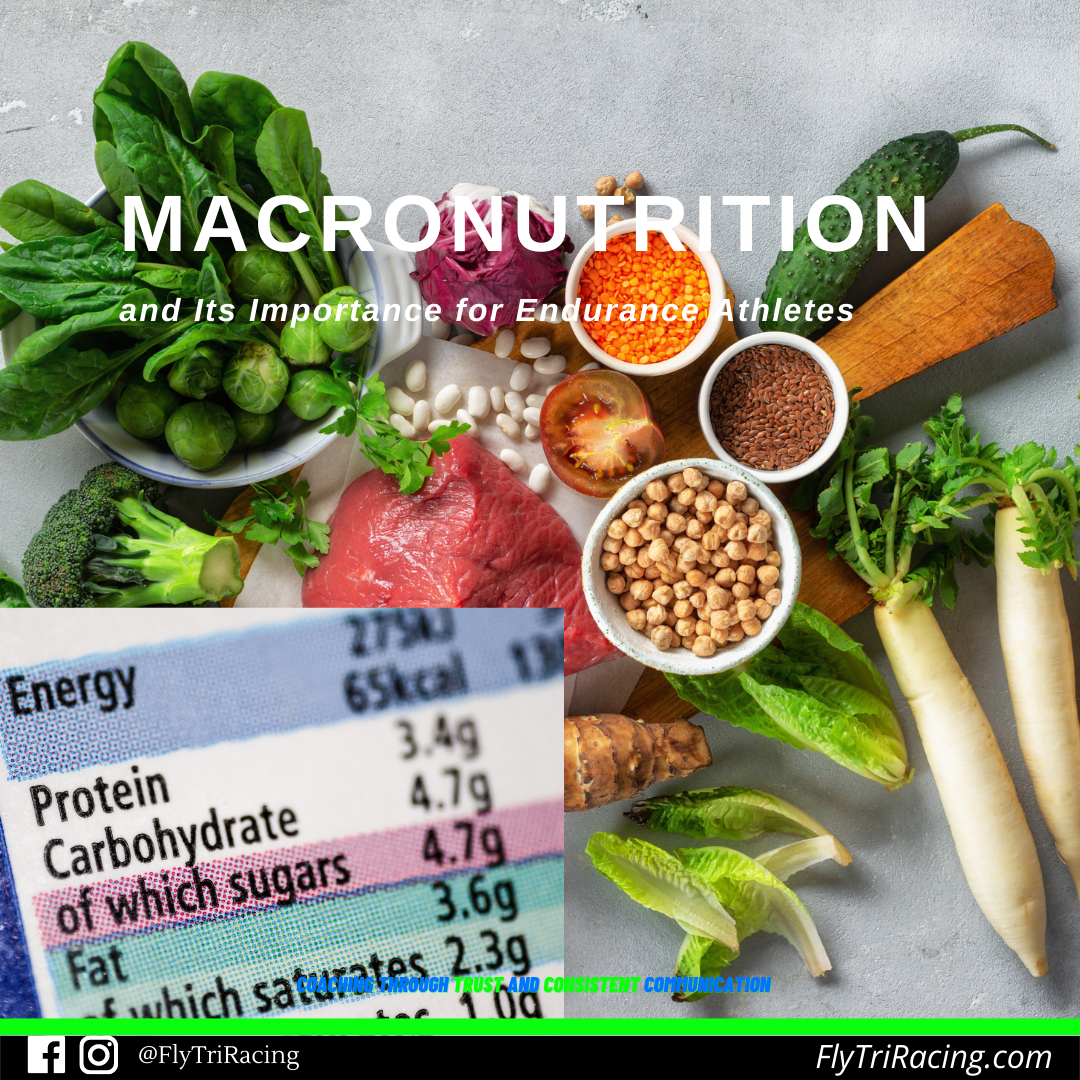Most athletes nearly always include improving nutrition in their annual goal-setting. And with that goal-setting comes the wondering of “Should I eat Whole30? Keto? Paleo? Or should I do some kind of ‘detox’.” Certainly, eating the right foods plays a huge role in your overall athletic performance, long-term health, and how you feel each day. When I surveyed the athletes we coach the topic of nutrition was the most common topic people were interested in learning more about. Unfortunately, the basics of nutrition often get overly complex with all the trends mentioned above, and more.
Just like your training, it’s important to be consistent. You do not have to be perfect, but you do need to be consistent. Nutrition is another component of training that can be used to improve your ability to recover and adapt to your training.
In this article, I’m aiming to piece together the most important fundamentals of the macronutrients (carbohydrates, proteins, and fats) you need to know to get your nutrition off to the right start so you can further reach your athletic potential, improve your overall health, performance, and how you feel. In this first article we will discuss the importance of the infamous and sometimes controversial element of carbohydrates.
Carbohydrates: Your Friend, NOT your Foe
Carbohydrates have received a lot of negative attention over the years with those following fad trends. Many people place carbohydrates into one broad category: bad. Which is simply not true. Carbohydrates have a few special features that make them very important. First, carbohydrates are relatively limited compared to our fat stores and can be manipulated daily or based on exercise sessions. Secondly, carbs are a key fuel source for our brain, central nervous, and muscular system. This is the brain’s main source of energy which will use about 100 grams of carbohydrates per day. This carb demand by the brain is equivalent to about five small bananas.
Carbohydrates’ key advantage over fat is that it can provide a greater yield of ATP (Adenosine Triphosphate) per volume of oxygen to the mitochondria, which means it’s way more efficient at providing energy than using fat as a main source of fuel.
The third key advantage of carbohydrates is that for long or high intensity training carbohydrate supplementation is needed to enhance endurance, because our bodies only have the ability to store about 1600-2000 calories of carbohydrates at a time. For most people this is enough to get you to mile 16 to 20 of a marathon before the big bonk hits.
Chart A. Pictures of the different carbohydrate examples that can be used to meet fuel needs.
Your high-sugar sport nutrition drinks, gels, chews, etc. should really only be limited to times you are training for long periods or at a high level of intensity and otherwise avoided.
Think about how many carbohydrates you actually need. A person who trains about an hour a day needs about 5 grams per kilogram of body weight per day. So a person who weighs 180 pounds needs about 400 grams of carbohydrates everyday. (In another article coming soon we will show you how much carbohydrates you need for training.)
Chart B. An example how to calculate your carbohydrate needs from the above paragraph
Think of carbohydrates as the good guy who provides the ability to have more power or a faster pace. Up next, we will discuss the role that protein plays in performance.
Part 2 – Protein: More than Muscle Building
Protein plays a very important role in the fueling of endurance athletes. Protein is mainly known for muscle building, but that’s not all it does. Protein is the base of all cells, enzymes, and even some hormones. Protein also plays a role in transporting various substances around the blood and is a critical component of the immune system.
Protein is also an energy source that can convert into carbohydrates through a process called gluconeogenesis. This is one reason why runners are so lean, as this process uses fatty and amino acids from lean muscle tissue. Thus, consuming enough protein is vital for the endurance athlete. For those training more than three hours at a time may want to consider having small amounts of protein available during their training and racing.
A common question about protein is, “Can I get all my protein from vegetable sources?” Yes, you can! However, protein from animal sources is more similar to humans and contains all the essential amino acids. That doesn’t mean you have to eat animal sources to get all your amino acids, but you will need to include a wider variety of vegetable sources to ensure you get all the essential amino acids.
Another common question is, “Will eating protein make me gain muscle?” As an endurance athlete we don’t want to put on extra muscle mass, especially muscle that will not help us increase our power. Eating protein will not make you bigger. Protein can help support your growth through repair. And if you’re endurance training six hours a week or more and strength training, then muscle growth will be slim to none.
Most athletes require about 1.5g of protein per kilogram of body weight per day. A 180 pound endurance athlete will need about 120 grams of protein per day. Researchers have suggested that protein intake ranges anywhere from 1.2g to 2.0 g / kg per day and this depends on the training intensity. The more intense the training session, the more you will need.
Chart C. An example of 10 and 20 gram protein sources
Finally, when it comes to post-training, fueling is the prime time to consume protein as well as carbohydrates. It’s suggested to take in 0.25-0.3 g / kg and this equates to about 15-25g of protein.
Proteins are your friends that help keep you strong and your immune system healthy. Next, we will discuss the role that fat plays.
Part 3 Fats: Do you have Fat?
Fats are an essential component of the overall diet for the endurance athlete. Fats play a role in providing energy, just not as quickly as carbohydrates do. But they are a critical piece of the cell membrane that helps facilitate the absorption of fat-soluble vitamins. It’s very important that athletes maintain their fat intake to 20% or more of their total caloric intake so they can absorb fat-soluble vitamins and fatty acids, especially omega 3.
There are two essential fats we need to be concerned with. Omega 3 and Omega 6 fats. In Omega 3 fats there are several omega 3 fatty acids but the primary ones to be concerned with are EPA (eicosapentaenoic acid) and DHA (docosahexaenoic acid). EPA is important because it plays a role in helping to manage stress in and around sport. DHA helps with the brain and nerves. Both of these are also important for immune health.
Fish oil is a popular supplement that about 20% of the population takes regularly. Fish oil contains primarily EPA and DHA and is beneficial because our modern diet tends to be low in omega 3. Fish oil may help with a reduction in aches, pains, and rheumatoid conditions, and also improves cognitive function.
Chart D. An example of best omega 3 fat sources
Conclusion
Knowing more about these key macronutrients is a great start in your journey to using nutrition to improve your athletic performance. Nutrition should be structured with your hard, easy, long, and light days of training. To further dial in your nutrition you may want to consider doing our performance test. A RMR (resting metabolic rate) test will help you see how many calories you use at rest. Also a V.02 max zone test can help you determine how many calories you burn at a certain heart rate. To learn more about these tests visit our website.
In a follow up we will put together an article on how to use carbohydrates to fuel your training.

ABOUT WILLIAM RITTER
William Ritter, from Tyler Texas is the Head Coach at Fly Tri Racing. He is a TrainingPeaks Level 2 Accredited Coach, Ironman U, Tri Sutto Coaching Certified, USA Triathlon Coach with focus areas in Long course, Short course, and Youth & Junior’s, USA Cycling, and USA Track and Field Level 2 Endurance Certified Coach and USATF Cross Country Specialist. He specializes in coaching triathletes and runners of all abilities. Ritter’s coaching is detailed and based on the individual athlete blending the art and science of coaching. To learn more about Ritter and personal coaching visit www.flytriracing.com or send email to flytriracing@gmail.com.




